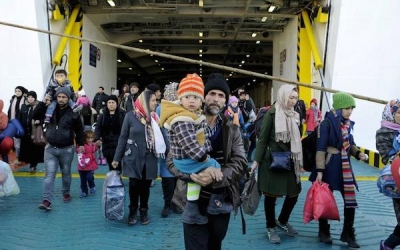Is the refugee crisis hitting Greek port security code compliance?

Piraeus port, one of the world’s largest passenger ports, is ISPS compliant….or is it? With thousands of the 45,000 refugees now stranded in Greece, milling around within the confines of the port’s perimeter, not only impeding the smooth operation of the port’s passengers ship but making the whole operation very dangerous.
The situation is repeated in the east Aegean island ports of Lesvos, Samos and Kos as the flow of boat people from Turkey to Greece, and until a few weeks back possibly to wider Europe, continues unabated bringing into question Greek compliance with the International Ship and Port Facility Security (ISPS) Code.
It is mandatory and signs secured to fences around Greek ports declare the ports are in compliance.
The smooth working of Greek ports are vital to the country’s struggling economy and with the Greek Easter holiday just a month away, marking the beginning of the much heralded tourist season, concern is growing over not only security, but overall safety, in a large part of many port areas.
“The whole port of Piraeus is in a mess, with the approaching seasonal problem for passengers, truck drivers and the refugees, something has to be done quickly,” said a passenger ship agent.
Indeed, islanders are already suffering and the agent says unless the Shipping ministry does something the tourist season will be lost.
European leaders have come up with a plan to control the flow of refugees and migeant which most people directly involved believe will not work.
The plan is based around the EU resettling one refugee directly from Turkey for every refugee that crosses the Aegean and arrives in Greece and to become operable will entail a huge amount of legal and technical work for Greek authorities. The country’s asylum service will have to be overhauled immediately, starting with the recognition of Turkey as a “safe third country,” which would allow asylum seekers to be returned there from Greece.
Legislation would also have to change so that asylum applications are processed within days rather than months, as is the case now. At the same time, Greece will have to remove all the refugees and migrants currently on its islands and take them to camps on the mainland, meaning some 9,000 people will have to be transferred immediately.
With Greece’s neighbours closing their borders movement north is blocked. The Athens government has to set up a system to register and process any new arrivals on the islands and examine their asylum applications. Each person applying for asylum will have to be interviewed as part of the process and each application examined separately. The arrivals will have the right to appeal if their asylum claim is rejected a process requiring hundreds of public servants and other personnel to be stationed on the islands. Also, there will be Turkish observers on the islands to ensure the refugees sent back have traveled from Turkey in the first place.
Meanwhile, the cost of managing the migrant crisis in Greece will exceed a previous estimate of EUR600m ($670m) says Bank of Greece governor Yannis Stournaras.
HEADLINES
- Do shipping markets want Biden or Trump for the win?
- All 18 crew safe after fire on Japanese-owned tanker off Singapore
- Singapore launching $44m co-investment initiative for maritime tech start-ups
- Cosco debuts Global Shipping Industry Chain Cooperation Initiative
- US warns of more shipping sanctions
- China continues seaport consolidation as Dalian offer goes unconditional